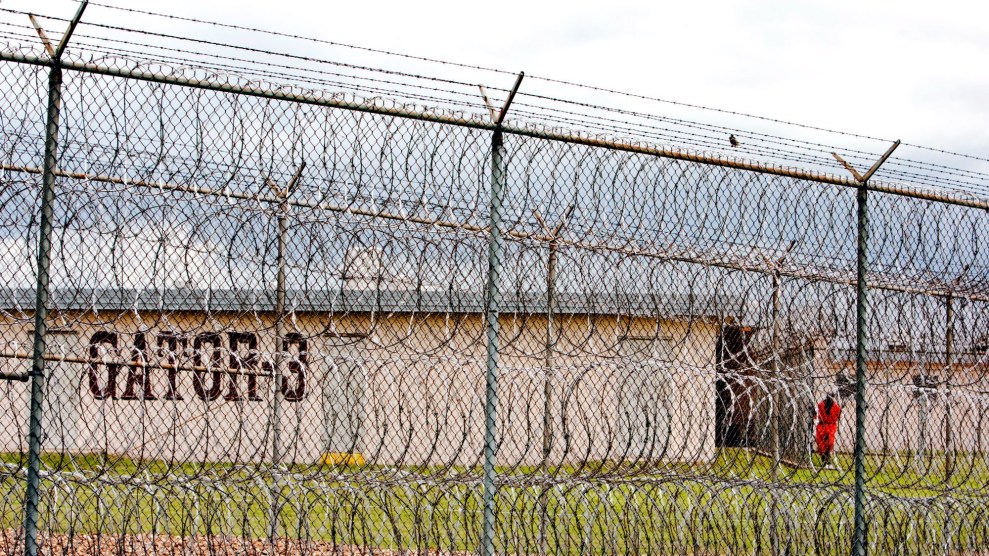
Judi Bottoni/AP
On Friday, a federal judge ordered the Louisiana State Penitentiary, the country’s largest maximum security adult prison, to relocate all incarcerated youths being held in the facility’s former death row building by September 15 after findings revealed that they were living in unsafe conditions and suffering inhumane punishments. US Chief Judge Shelly Dick, who reluctantly ruled in favor of the children’s detention last year, called the boys’ treatment “unconstitutional.”
“For almost 10 months, children—nearly all Black boys—have been held in abusive conditions of confinement at the former death row of Angola,” said ACLU attorney, David Utter, in a statement. “We are grateful to our clients and their families for their bravery in speaking out and standing up against this cruelty.”
Since their imprisonment in Angola started, boys between the ages of 14 and 18 were held in buildings with no air conditioning during dangerous heat waves, with temperatures reaching as high as 130 degrees, according to the Associated Press. They were given water from unsanitary faucets and poor quality food. Prison officials were reportedly punishing children with handcuffs, pepper spray, denials of family visits, and extended time in solitary confinement. They also allegedly failed to provide adequate educational or mental health services for the detained teens.
In July 2022, Gov. John Bel Edwards announced a plan to transfer incarcerated youths with a history of violence to the prison, after six children escaped Bridge City Center for Youth, carjacked a vehicle, and shot the driver. This move was strongly criticized by human rights and criminal justice reform advocates due to facility’s violent reputation, inhumane conditions, its documented history mistreating of prisoners. As my colleague, Samantha Michaels, wrote at the time:
During a tour of the building earlier this month, [Vincent] Schiraldi, the former commissioner of the New York City Department of Correction, observed conditions that he believed might traumatize children. Entering the prison gates, he passed coils of razor wire and a sign that read “Weapons Check In/Out.” The kids’ housing unit was surrounded by a fence, which state officials said they would wrap with “blackout” fabric “so that no one can see in or out,” to prevent the children from interacting with adult prisoners outside. In the lawsuit, attorneys for the plaintiffs wrote that “youth at Angola will live in single cells with floor-to-ceiling metal bars with no privacy, no windows, and open metal toilets.”
These conditions are overly punitive for children who are not even criminals, but are rather deemed “delinquents” and held in civil detention. “Arbitrarily transferring young people” to “a place with thousands of people convicted of crimes…is clearly punishment, which is not permitted for those who are civilly detained, and violates young people’s due process rights under the Fourteenth Amendment,” the attorneys wrote in their complaint.
Once known as “America’s bloodiest prison,” Angola has a reputation for brutal beatings by guards and fights among inmates. Even Judge Dick, during her first ruling last September, acknowledged that the conditions could be potentially “traumatizing” for incarcerated youths. Ultimately, she ruled in favor of the transfer, arguing that while “the prospect of putting a teenager to bed at night in a locked cell was disturbing,” “the threat of harm these youngsters present to themselves and others” was “intolerable.” Now, nearly a year later, the judge found that state officials broke nearly every promise it made to provide the children with “a constitutional level of care.”
While prison reform activists consider the new ruling a victory, they’re still fighting to improve Louisiana’s juvenile justice system, which has been plagued with problems like rampant physical and sexual abuse and deficient mental health care.
“Now, it is time for Louisiana’s leaders to provide the appropriate care and support so all children can thrive and reach their full potential,” wrote Utter. “We demand investment in our children, not punishment.”
This post was originally published on this site be sure to check out more of their content.






